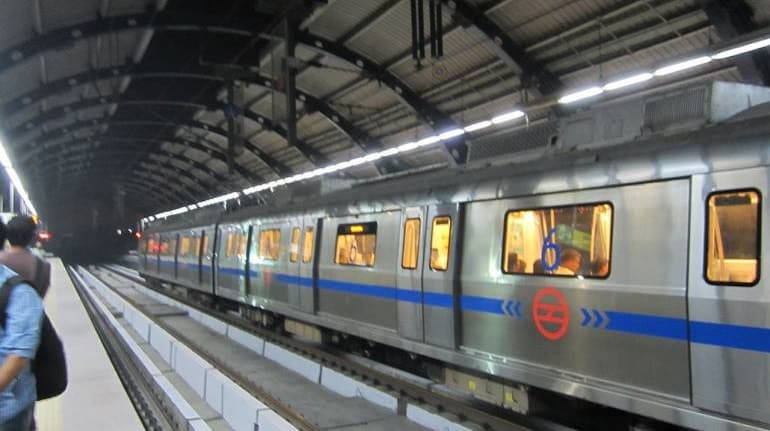



Metro train services in Delhi may be allowed when the 'Unlock 4' phase of the graded reopening from the coronavirus-induced lockdown begins on September 1, sources said.
Metro services were suspended in late March to combat the spread of the novel coronavirus, which has infected more than 31 lakh people in the country so far.
The Unlock 4 guidelines are expected to be issued later this week.
Strict enforcement of the lockdown in containment zones will continue across India.
Massive revenue loss
Shut for more than four months following the coronavirus outbreak, Delhi Metro, the lifeline of the National Capital Region, has lost approximately Rs 1,500 crore in revenue, sources have told Moneycontrol.
“The DMRC (Delhi Metro Rail Corporation) normally earns Rs 300 crore every month,” a source said.
Normally, the DMRC has 300 trains running on eight lines, making 5,000 trips a day and carrying around 1.8 million passengers. But with the trains halted in their tracks, it hasn’t earned a penny in the past four months.
Other income also affected
The transporter’s Income from other sources, such as commercial and retail leases, has also dried up during the pandemic.
“DMRC’s tenants’ businesses, including retail and commercial properties, have been affected badly. They have written to us asking us to defer rental payments. We are looking at government guidelines on this. If we take coercive action against these tenants, some of them might be forced to go away. We need to support them at this hour. The pandemic has still not settled down. So, we are yet to take a call on these things,” Anuj Dayal, Executive Director, Corporate Communications, DMRC, told Moneycontrol.
Currently, there are about 400 shops in the Metro stations, apart from the stations with property development such as Nehru Place, HUDA City Centre etc. In 2018-19, DMRC’s earnings from non-passenger revenue stood at ₹594 crore, including income from rental, lease as well as consultancy-related sources.
Government call awaited
The government has been easing restrictions since late May and opening the economy in a staggered manner.
The decision to reopen the network lies with the government, said Dayal. “As and when they decide, we are on standby. We should be in a position to open the metro within two to three days when the government takes the decision,” he said.
Protocols are in place for physical distancing and sanitisation procedures, Dayal added.
In its Unlock 3.0 roadmap, industry body Ficci had suggested, among other things, that the government reopen multiplexes, cinemas and metro rail, and allow international flights while adhering to safety precautions.
Trains should not stop at stations that fall in containment zones and security personnel should ensure adherence to safety guidelines, the industry body had said.
Unlock 3.0 began relaxing restrictions on August 1.
Cautious opening expected
Metro services may start with less than 50 percent capacity initially and this may be increased gradually, along with contactless ticketing as far as possible.
In Mumbai, suburban train services resumed on June 15 but only for workers providing essential services.
Infrastructure experts said it would be difficult to maintain physical distancing in the metro. Though metro networks had reopened in several countries, there were few takers for public transport.
“Most global metro systems have reopened with 60 to 100 percent of running capacity but passenger patronage has been a dismal 20 to 25 percent. The reason is that people are still wary of using public transport,” said Ajay Sharma, Managing Director, Valuation Services, Colliers International India.
Recovery plan needed
It will be some time before services can resume and DMRC will have to come up with a plan to recover losses.
Any metro project has two major sources of revenue — the farebox, which accounts for almost 80 to 90 percent (it comprises ticketing, passes, sales) and non-fare box revenue, which accounts for 10 to 20 percent, and is earned through commercial and retail leases on DMRC land.
Though trains have not been running, there are fixed costs such as maintaining the network and paying salaries, said Sharma.
Operational losses cannot be made up by non-fare revenue. Also, metro systems cannot recover losses completely.
They can at best offset a certain percentage of the loss by increasing ridership, enhancing frequency and speeding up construction work on new corridors, Sharma said.
Long-term revenue recovery options
Other options to recover losses include the Value Capture Finance mechanism, wherein additional taxes can be levied on properties located around new lines, and through Transit-Oriented Development, wherein additional floor space index can be provided for land parcels close to the station.
But both these methods are for the long term and new lines. In the short term, the metro can shore up revenue by improving density, increasing the frequency of trains and getting higher ridership, Sharma added.
It has been reported that DMRC may not be able to pay this year’s instalment of the Rs 35,198-crore soft loan it has taken from Japan International Cooperation Agency (JICA) for construction.
Discover the latest Business News, Sensex, and Nifty updates. Obtain Personal Finance insights, tax queries, and expert opinions on Moneycontrol or download the Moneycontrol App to stay updated!
Find the best of Al News in one place, specially curated for you every weekend.
Stay on top of the latest tech trends and biggest startup news.